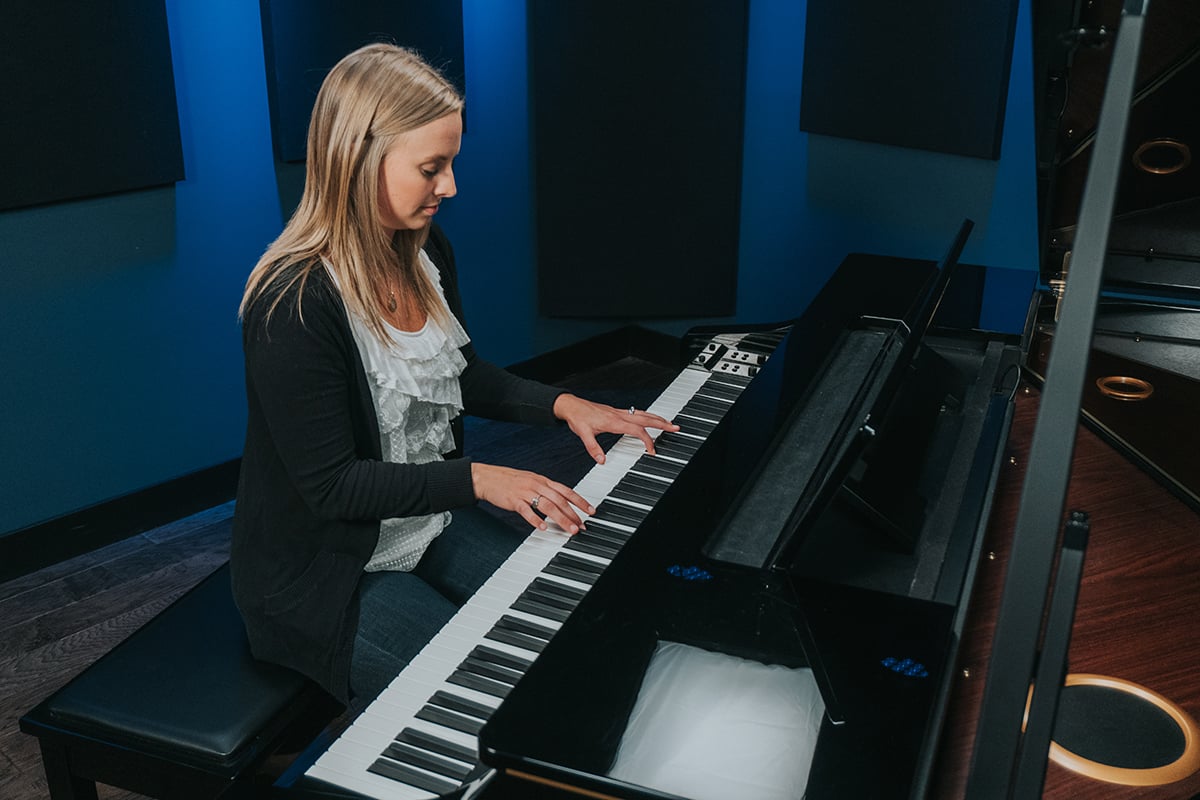<< Grab your FREE practice tracker here >>
Do you have a plan when you sit down to practice?
I actually asked this question on our social media channels, and the answer was an overwhelming — NO.
Most of you don’t have a plan when you sit down to practice the piano. BUT — most of you also wish that you did! So I’m here to teach you how to create your own practice plan.
Research and studies show that when we have goals and a PLAN on how to achieve those goals we are FAR more likely to be successful.
There are 4 elements to a perfect piano practice.
You should ALWAYS warm up when you sit down to play the piano. Even if it’s just one or two scales, you need to get the blood flowing to your fingers.
This helps avoid strain and injury, but it also helps you to mentally prepare to start practicing the piano. It tells your fingers and your mind that you have “arrived” at the piano.
Everything else that was going on in your day isn’t important right now. This is piano time.
And honestly, there’s nothing like the feeling of warmed up fingers!
Ok … I know.
Technique is not fun. It’s not cool and it can be really frustrating. But it’s SO IMPORTANT. Technique is the “bread and butter” of your piano playing ability and skill.
It allows you to learn songs so much faster and easier, and sound more professional.
So you know you have to do it. But I have a way that will make bearable (and maybe even fun).
Match your technique to your goals. What I mean by that is to think about what you want to play. You might be working on a particular song, let’s say “Hallelujah” by Leonard Cohen. If you want to be able to play that song in the key of G, then do your technique practice in that key!

Technique is the foundation to piano playing. If technique has been holding you back from playing the songs you love, check out Piano Technique Made Easy with Cassi Falk. This course, free with your Pianote membership, will take you through all 12 major and minor keys as you master scales, arpeggios, chords, and more.
Practice your left-hand arpeggios in the key of G. You’ll get better at them and when it comes time to practice the song you’ll already be familiar and comfortable.
But a warning — DON’T use this as an excuse to practice only in your favorite keys.
Once you’re done with technique practice, it’s time to move on to the main event.
This is what you’re here for. We play the piano to play songs, not scales, not arpeggios. We only practice those so we can play songs.
This will take up the bulk of your practice time. But remember, this is practice — not performance. That means working on the parts of the song you are struggling with.
Too often I’ve seen students just run the song from beginning to end. And you know what? The beginning of a lot songs is quite easy, so they get good at that part.
Meanwhile, there’s a section in the middle of the song they struggle with. But when they reach it and make a mistake, they start at the beginning again!
Work on your weaknesses. It’s the best way to make sure you stop making the same mistakes over and over again.
Once you have spent enough time working on your song, the practice is nearly over.
But there’s one more important part.
This is the best way to end a practice. Close the songbook, shake off any frustration you might have and just … play. You can play ANYTHING!
It could be improv, a song you know really well and just love to play.
Or you could just key mash! Try it, it’s super fun 🙂
This allows you to end the practice feeling good, and hopefully excited to come back tomorrow and continue to improve.
It’s a common question, but there’s no one answer. It really depends on your life, your goals, and your schedule. It’s more important to be consistent with your practices than to make them really long. 10 minutes a day is much better than 60 minutes once a week.
But however long you can find to practice, take a few minutes to PLAN it and include these 4 elements.
And as always, have fun!
Lisa Witt has been teaching piano for more than 20 years and in that time has helped hundreds of students learn to play the songs they love. Lisa received classical piano training through the Royal Conservatory of Music, but she has since embraced popular music and playing by ear in order to accompany herself and others. Learn more about Lisa.
/marketing/pianote/promos/april/banner-bg-m.webp)
We use cookies for traffic data and advertising. Cookie Policy »
/marketing/pianote/promos/april/banner-title.webp)